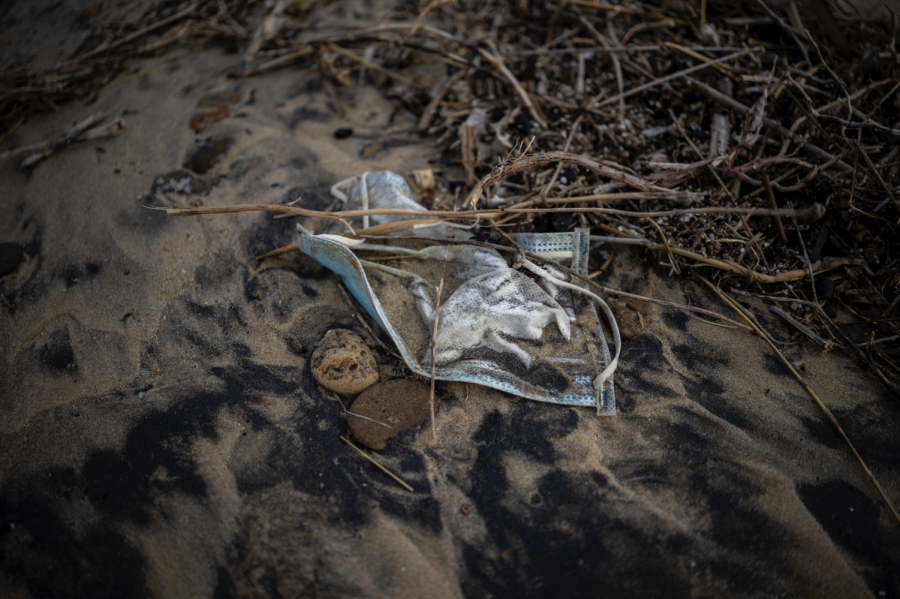The Secret Life of Disposable Masks
Imagine playing the game “spot the difference.” The topic of interest? Colgate’s campus. The different landscapes of comparison? Fall of 2019 vs. Spring of 2022. One of the noticeable differences on the grounds of campus would be the presence of dirty disposable masks, stepped on and forgotten about, lying on the pavement. This experience is not unique to Colgate’s campus nor to any public area around the world these days.
Although global Carbon emissions reduced drastically at the beginning of the semester, the New York Times reports that these quickly rebounded and other practices normalized during the pandemic have worked to cause further harm to the environment. Disposable masks, though they work to save lives and stop the spread of the coronavirus and its mutations, have also worked to skyrocket the amount of litter present, especially the amount of mask waste on a worldwide scale. In fact, ABC Science has reported a 9000% increase in mask pollution since the start of the pandemic in 2019. A little over two years later, scientists from the University of Southern Denmark have discovered that every minute, individuals around the world collectively throw away approximately three million face masks, according to the Science Daily.
Over the last two years, disposable face masks have helped protect many lives. However, once they are off our faces and onto the ground, these masks can serve as a threat to our surrounding environment and have increasingly impacted how many ecosystems function and how animals live.
In fact, these life-saving utilities have more of an environmental impact than one may think. First and foremost, masks, particularly their straps, may entangle or harm both plants and animals and disrupt, and even end, their lives. These plastics also end up in the ocean, which can harm aquatic life just as much as straws and other plastic waste.
Although plastic is easily identifiable as a pollutant, other debris also harms the environment. Researchers from ABC News reported that disposable masks contain and emit harmful chemicals and tiny plastic particles. What impact could this have on the ecosystem? You guessed it — they may make their way into the food chain, and, as a result, into our bloodstream.
Reusing medical masks does not seem to be a clear solution, in this case. Have you ever found yourself in a mask emergency, without a face covering when trying to enter Frank Dining Hall or board the Cruiser? In those situations, it can be easy to want to use a friend or stranger’s old disposable mask. In those situations, think again — ABC News researchers have also found that these masks could carry around remnants of the coronavirus — meaning that although you were trying to be safe, you actually just ended up putting yourself at a bigger risk of contracting the COVID-19 virus. N-95 masks, however, can be reused safely after being stored in a paper bag for five to seven days, according to the New York Times.
So, where does this information leave us? While it seems almost impossible for one person’s efforts to be more mindful about mask disposal, any effort helps to minimize mask waste. PBS News says that an easy way to be more mindful about paper mask disposal is to cut off mask straps before you put them in the garbage. This action eliminates the possibility of wildlife getting caught between the strings while they are connected to the mask.
In addition to this, some disposable mask manufacturing companies have begun to incorporate recycled and organic materials into their masks, which prove to be a better alternative for the environment than the average disposable mask. An NBC News article titled “How to reduce face mask pollution, according to experts” provides a list of several companies that have begun implementing this practice into their manufacturing processes. If you are on the lookout for new masks, check these companies out! Scientists from NBC News also recommend a simple but impactful tip: when disposing of your masks, make sure to place the masks in a closed garbage container to reduce the risk of the masks going into ecosystems and harming their way of life.
Over the last two years, masks have become an integral part of our society. They help to keep us safe, but we must also be conscious of how they may harm the environment around us. It does not take much, and this mindfulness can potentially make a big impact on the environment and everything and everyone that lives within it. Mask up and be mindful!










Michael • Feb 11, 2022 at 12:22 pm
Very cool!